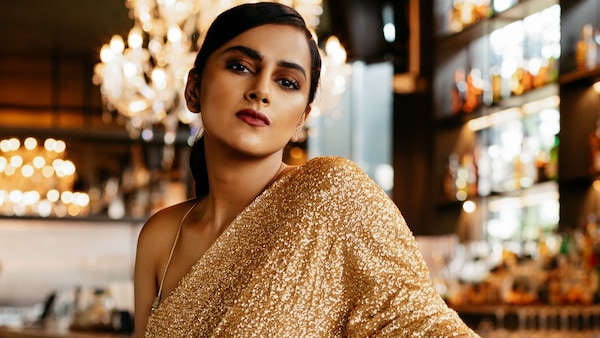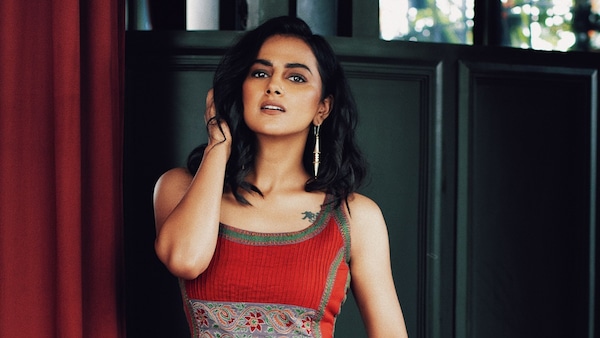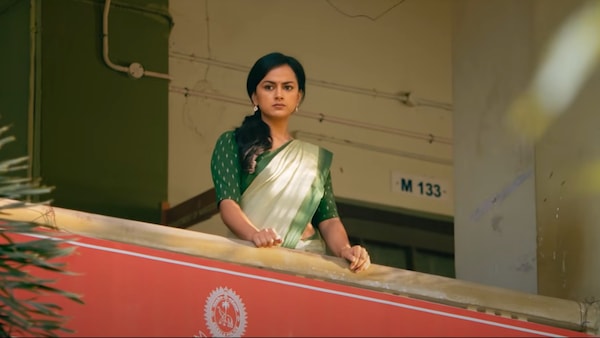Exclusive! Shraddha Srinath: As an actor, I aspire to have Mohanlal’s energy till the end of my career
The Kannada actress, who will be seen sharing screen space with the Malayalam superstar in Aaraattu, talks about working in B Unnikrishnan’s ‘mass’ entertainer, her take on OTTs and her upcoming Tamil film Kaliyugam

Last Updated: 11.41 AM, Feb 15, 2022
Mohanlal’s ‘mass’ entertainer Aaraattu is more like a second start in Malayalam to Jersey and Vikram Vedha fame Shraddha Srinath, who began her acting career with the Mollywood film Kohinoor back in 2015. The B Unnikrishnan directorial has Shraddha playing an IAS officer, who brings the “friction and drama” to the story of the ‘mass’ entertainer, which is set to hit theatres on February 18.
In an exclusive interview with OTTplay, the Kannada actress talks about working in the big budget Malayalam movie during the pandemic, her take on OTTs and her upcoming Tamil film titled Kaliyugam, which is a post-apocalyptic thriller set in 2050.
What prompted you to sign a ‘mass’ entertainer for your Malayalam re-entry?
Kohinoor was my de but as an actor and post that, I was looking forward to doing more Malayalam films, especially because I have been following them. There was nothing exciting for me, but I kept waiting for Malayalam films. Malayalam cinema is a treasure because the stories take precedence over everything. I have been observing it under a microscopic lens, and I was so impressed and desperate to get back to Malayalam films.
When Aaraattu happened, I didn’t look at it as a ‘mass’ entertainer. For me, it was an interesting character in the scheme of the story and something of substance. So, it was a ‘yes’ from my side from the very beginning.

It was a film shot smack in the middle of the pandemic and it was one of your first few films to shoot after the lockdown. How was the experience?
It was the very first film I shot in 2020, post the lockdown. So, the tensions were high and COVID-19 protocols were expected to be in place. Every single person in your vicinity was considered a threat. I left home as if I was going to war. It was quite terrifying because we were all so new to this. I have to tip my hat to the production team of Aaraattu for making all of us feel safe and comfortable. These protocols weren’t just formalities, every single person was wearing a mask and we had to do a mandatory quarantine for a few days before we moved to Palakkad, where we were shooting. There too, we were in a sort of a bio bubble. We had temperature checks every day; there was a camp set up in the location where they would note down our temperatures. Everybody was given name tags with little sanitiser bottles attached to it.
I was seriously impressed because you know that you are safe and you are keeping your staff safe. I am very uptight about these things, and I was stress-free during the shoot of Aaraattu. This set a high standard for me because after Aaraattu, every other set felt like a disappointment in terms of hygiene and safety.

You play a revenue divisional officer in the film. What appealed the most to you about the role, especially because there is this tendency for the female leads in superstar-driven ‘mass’ entertainers to be sidelined?
I remember discussing looks with Unnikrishnan sir and asking him if we could be slightly colourful, and him telling me that this isn’t a dandy character. She is there for a reason. As you can tell from the trailer, she is not there smiling and fluttering her eyelashes. She stands her ground and wants to have her way. She is that person who creates that friction and drama in the film, which is essential to the story. In the trailer, you don’t know the shades that Neyyattinkara Gopan has but she’s there to question all of that, which is very interesting for me.
Was there a particular takeaway while working with an experienced actor like Mohanlal that you had gone on to use in your subsequent movies?
I remember this interview that I read where Mohanlal sir had asked Unnikrishnan sir if he should act without inhibitions and the latter had given an affirmative nod. When I think of his performance in the film now, I understand where it came from. As actors, we aren’t born as public figures, baring our souls, weaknesses and vulnerabilities. Some of us fight with our minds on a daily basis. So, my takeaway is to perform without any inhibition.
There is this scene where he and I have an altercation and he walks away. A mob of people then join him as he does this. I remember his expression when he made his swift turnaround. Every muscle in his face was moving and his body was like a livewire. That was fascinating for me as an actor. I feel like despite being this whole routine for the past 40-odd years, as an actor he is so alive. I aspire to have that fire and energy in me till the end of my career.
Two of your movies - Maara and Krishna and His Leela - have been direct-to-OTT releases. How different has the feedback been for OTT releases compared to the theatrical ones?
That depends. OTT has a wider reach when you consider the pan-Indian or global audience. But sometimes, OTT fails to reach the people you wish had watched the movie because not everyone has subscriptions to the several streaming platforms we have today. However, it was also interesting and exciting to have OTT releases because it was like being part of a trend where everyone was releasing their films online, doing virtual interviews and all of that.
Compared to the other three South industries, Kannada cinema has had fewer direct-to-OTT releases. Do you believe this has to change?
I feel Kannada cinema is doing its best. People are realising that this is a great opportunity to make a project that is devoid of the kind of expectations one would have while releasing a movie in theatres, where numbers really matter. I feel that is slowly changing. A movie that I had recently watched, Garuda Gamana Vrishabha Vahana was excellent, and I feel tha t should be watched by everyone across the country. So, Kannada films might be lacking in numbers on OTT right now, but they are surely on their way there.
Of late, all South industries have been open to having actors from other industries leading their movies. As someone who has done films in all four languages, how much has that change opened doors for great female-centric roles?
It absolutely helps in terms of opportunities. That’s the reason I really survive in the industry. I started in Kannada; it’s the only regional language I knew how to speak as it’s my mother tongue. From there, I went on to Tamil, Telugu and now Malayalam. So, with a little bit of hard work, some luck, being seen in the right places at the right time and a lot of great PR, one can secure great roles, compared to, let’s say if it was a closed industry where only actors of Tamil-origin or Tamil domicile would get parts. If that was the case, I wouldn’t be eligible to act in any of the films that I have done so far. So, it helps me broaden my perspectives, horizons and learn about other industries and languages. As I had mentioned, the sole reason I continue to be an actor and do good films is because I now have the power to choose between good scripts from several languages. All actresses will vouch for this.
What can you tell us about your Tamil film post-apocalyptic thriller Kaliyugam, which went on floors in January?
It has a really crazy concept, almost like a science fiction on crack. It’s about when the basic things we take for granted – food, water, governance and discipline in life – are compromised, everyone is at war with each other. It’s in a scenario like that, set in 2050. The director and producer are debutants, and the entire crew is under 25, if I am not wrong. The pandemic has been hard on independent films and the film industry is harder to crack than one would imagine. So, I really hope something comes out of it.
I am really proud of the work I have done in the movie. We spent so many double call shifts, sleepless nights and had three hours of make-up every day. Shooting in a dark, closed room was difficult and extremely stressful. I am the heroine and I had all the comfort, so you can imagine what the others went through. For all that we have done, I am hoping there's progress and I am waiting to hear from them about the updates. I am waiting to show everyone what we have done. It’s a cracker of a film.
Subscribe to our newsletter for top content, delivered fast.

